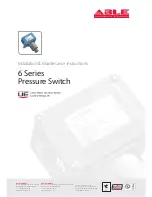
AS Series User Manual
369
Doc No.: AS5-0116-01
endpoint products that act as end user communication appliances supporting
IP media. Capabilities include all of the capabilities defined for the previous
Generic Endpoint (Class I) and Media Endpoint (Class II) classes, and are
extended to include aspects related to end user devices. Example product
categories expected to adhere to this class include (but are not limited to) end
user communication appliances, such as IP Phones, PC-based softphones, or
other communication appliances that directly support the end user.
Discovery services defined in this class include provision of location identifier
(including ECS / E911 information), embedded L2 switch support and inventory
management.
LLDP-MED
Capabilities
LLDP-MED Capabilities describes the neighborhood unit's LLDP-MED
capabilities. The possible capabilities are:
1. LLDP-MED capabilities
2. Network Policy
3. Location Identification
4. Extended Power via MDI – PSE
5. Extended Power via MDI – PD
6. Inventory
7. Reserved
Application Type
Application Type indicating the primary function of the application(s) defined
for this network policy, advertised by an Endpoint or Network Connectivity
Device. The possible application types are shown below.
1. Voice - for use by dedicated IP Telephony handsets and other similar
appliances supporting interactive voice services. These devices are typically
deployed on a separate VLAN for ease of deployment and enhanced security
by isolation from data applications.
2. Voice Signalling - for use in network topologies that require a different
policy for the voice signalling than for the voice media.
3. Guest Voice - to support a separate limited feature-set voice service for
guest users and visitors with their own IP Telephony handsets and other
similar appliances supporting interactive voice services.
4. Guest Voice Signalling - for use in network topologies that require a
different policy for the guest voice signalling than for the guest voice media.
5. Softphone Voice - for use by softphone applications on typical data centric
devices, such as PCs or laptops.
6. Video Conferencing - for use by dedicated Video Conferencing equipment
and other similar appliances supporting real-time interactive video/audio
Summary of Contents for AS5010-P
Page 40: ...AS Series User Manual 39 Doc No AS5 0116 01 values...
Page 69: ...AS Series User Manual 68 Doc No AS5 0116 01 values...
Page 85: ...AS Series User Manual 84 Doc No AS5 0116 01 event...
Page 103: ...AS Series User Manual 102 Doc No AS5 0116 01 values...
Page 136: ...AS Series User Manual 135 Doc No AS5 0116 01 Example MSTI Configuration...
Page 160: ...AS Series User Manual 159 Doc No AS5 0116 01...
Page 175: ...AS Series User Manual 174 Doc No AS5 0116 01 Fig LLDP MED Configuration...
Page 192: ...AS Series User Manual 191 Doc No AS5 0116 01 values...
Page 199: ...AS Series User Manual 198 Doc No AS5 0116 01 member of all possible VLANs...
Page 213: ...AS Series User Manual 212 Doc No AS5 0116 01 Fig The IP Voice VLAN Configuration...
Page 224: ...AS Series User Manual 223 Doc No AS5 0116 01...
Page 228: ...AS Series User Manual 227 Doc No AS5 0116 01 Fig The Port Tag Remarking...
Page 237: ...AS Series User Manual 236 Doc No AS5 0116 01 Fig The DSCP Classification Configuration...
Page 240: ...AS Series User Manual 239 Doc No AS5 0116 01 Fig The QoS Control List Configuration...
Page 257: ...AS Series User Manual 256 Doc No AS5 0116 01 Fig The sFlow Configuration...
Page 401: ...AS Series User Manual 400 Doc No AS5 0116 01 default is 3...
Page 403: ...AS Series User Manual 402 Doc No AS5 0116 01 No Click to undo any restart action...
Page 415: ...AS Series User Manual 414 Doc No AS5 0116 01 Fig DMS Information Screen...
Page 418: ...AS Series User Manual 417 Doc No AS5 0116 01 Version Device firmware version...
Page 428: ...AS Series User Manual 427 Doc No AS5 0116 01 Fig the DMS Diagnostics Section...















































